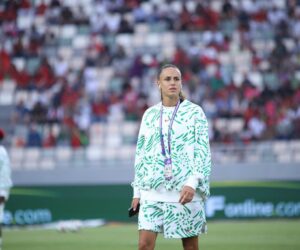The Senate on Wednesday confirmed the appointment of new service chiefs after pledging to ensure rapid improvement in the nation’s security following individual screening.
The newly confirmed service chiefs, appointed last week by President Bola Tinubu, are Lt. General Olufemi Oluyede as the Chief of Defence Staff (CDS); Major General Waidi Shaibu, Chief of Army Staff (COAS); Rear Admiral Idi Abbas, Chief of Naval Staff (CNS); and Air Vice Marshal Kennedy Aneke as the Chief of Air Staff (CAS).
Their confirmation was announced by the President of the Senate, Senator Godswill Akpabio, after they were properly grilled in a closed-door session that lasted about two hours.
Before their confirmation, the service chiefs outlined an ambitious roadmap to reform the armed forces, strengthen inter-agency collaboration, promote local production of military hardware, and improve the welfare of troops serving in combat zones across the country.
General Oluyede, who until recently headed the Nigerian Army, said his primary mission would be to build a self-reliant, technology-driven defence system that can sustain operations without excessive dependence on imported equipment.
“We cannot continue to rely on foreign suppliers for our weapons. It is economically unsustainable and strategically risky. My focus will be to build a strong local military-industrial base that can produce what we need to defend the nation,” he told the lawmakers.
The Defence Chief, a veteran of counter-insurgency operations in Liberia, Bakassi, and Nigeria’s North-East, said he would prioritise intelligence-led warfare and ensure that joint operations between the Army, Navy, and Air Force are technology-supported and data-driven.
“Our approach will be multi-domain and multi-agency. We will strengthen night operations, train more special forces, and employ real-time intelligence to dominate all terrains,” he said.
General Oluyede emphasised troop welfare as a critical part of his leadership agenda, describing morale as the “backbone of fighting power.” He promised to improve housing, healthcare, and education for soldiers’ families, and ensure prompt payment of benefits.
He also called for a comprehensive reform of the Nigeria Police Force to enable it to take full control of internal security so that the military could focus on external defence.
“The military alone cannot secure Nigeria. Security is everyone’s business — the government, the communities, and civil institutions. But we must also empower the police to handle internal threats effectively,” he said.
Several senators commended Oluyede’s strategic plans and field experience. Senator Mohammed Monguno (Borno North) lauded his leadership in the fight against insurgency, while Senator Adamu Aliero (Kebbi Central) urged him to make troop welfare a non-negotiable priority.
In his response, the Chief of Defence Staff nominee pledged to strengthen the Federal Government’s Operation Safe Corridor initiative, which rehabilitates repentant insurgents, assuring that the programme would include victims and affected communities in the reconciliation process.
Rear Admiral Idi Abbas, confirmed as Chief of Naval Staff, promised to overhaul Nigeria’s maritime security operations with a focus on modern surveillance systems, anti-piracy efforts, and the prevention of oil theft.
He dismissed the proposal for a separate Coast Guard, noting that the Navy already performs such duties and only needs improved funding and equipment.
“The Navy’s constitutional roles already cover what a Coast Guard would do. Rather than duplicating institutions, the government should strengthen the Navy with better logistics and surveillance technology,” he stated.
Abbas said the Navy was deploying drones to monitor remote creeks and waterways where crude oil theft and illegal bunkering persist, adding that a Special Operations Command has been established in Makurdi to strengthen inland waterway patrols between Benue and Lokoja.
He also emphasised the importance of emotional reconciliation in reintegration programmes, warning that the pain of victims must not be ignored while rehabilitating repentant militants.
“Deradicalisation must include justice and healing. Communities that lost loved ones should be part of the peace process,” Abbas said.
Air Vice Marshal Kennedy Aneke, who was confirmed as Chief of Air Staff, pledged to reposition the Nigerian Air Force as a “combat-ready, disciplined, and intelligent” force built on precision technology and rapid-response capacity.
Aneke said he would expand Nigeria’s drone capabilities and invest in research to modernise air operations. “Modern warfare is technology-driven. Unmanned aerial systems now perform many missions better and safer than manned aircraft. We will invest in them,” he said.
On concerns raised about the state of Nigeria’s $1.2 billion Super Tucano aircraft, the Air Chief assured senators that the fleet remains operational and crucial to ongoing counter-insurgency efforts.
“The Super Tucanos are flying every night in the North-East and North-West. We may not publicise their missions, but they are performing effectively,” he said, adding that each missile used in operations costs about $100,000, a price he described as “the cost of peace.”
He also vowed to prioritise pilot training, aircraft maintenance, and the welfare of personnel, calling for legislative support in funding defence technology and operations.
Across their individual presentations, the three service chiefs outlined a unified vision for Nigeria’s security future, one that centres on synergy, innovation, and welfare.
General Oluyede promised to drive joint military operations, Rear Admiral Abbas committed to securing the nation’s maritime assets, and Air Vice Marshal Aneke vowed to ensure air dominance through precision technology.
All three reaffirmed their loyalty to President Bola Tinubu’s defence reform agenda and pledged to deliver tangible results in the fight against terrorism, banditry, and oil theft.
“We are here to serve,” Aneke concluded, saying, “Every naira invested in the military must translate into peace, safety, and pride for Nigerians.”
With their confirmation, the trio now form the backbone of Tinubu’s new national security strategy, charged with restoring stability to the North-East, ending banditry in the North-West, and safeguarding Nigeria’s territorial integrity across land, sea, and air.








